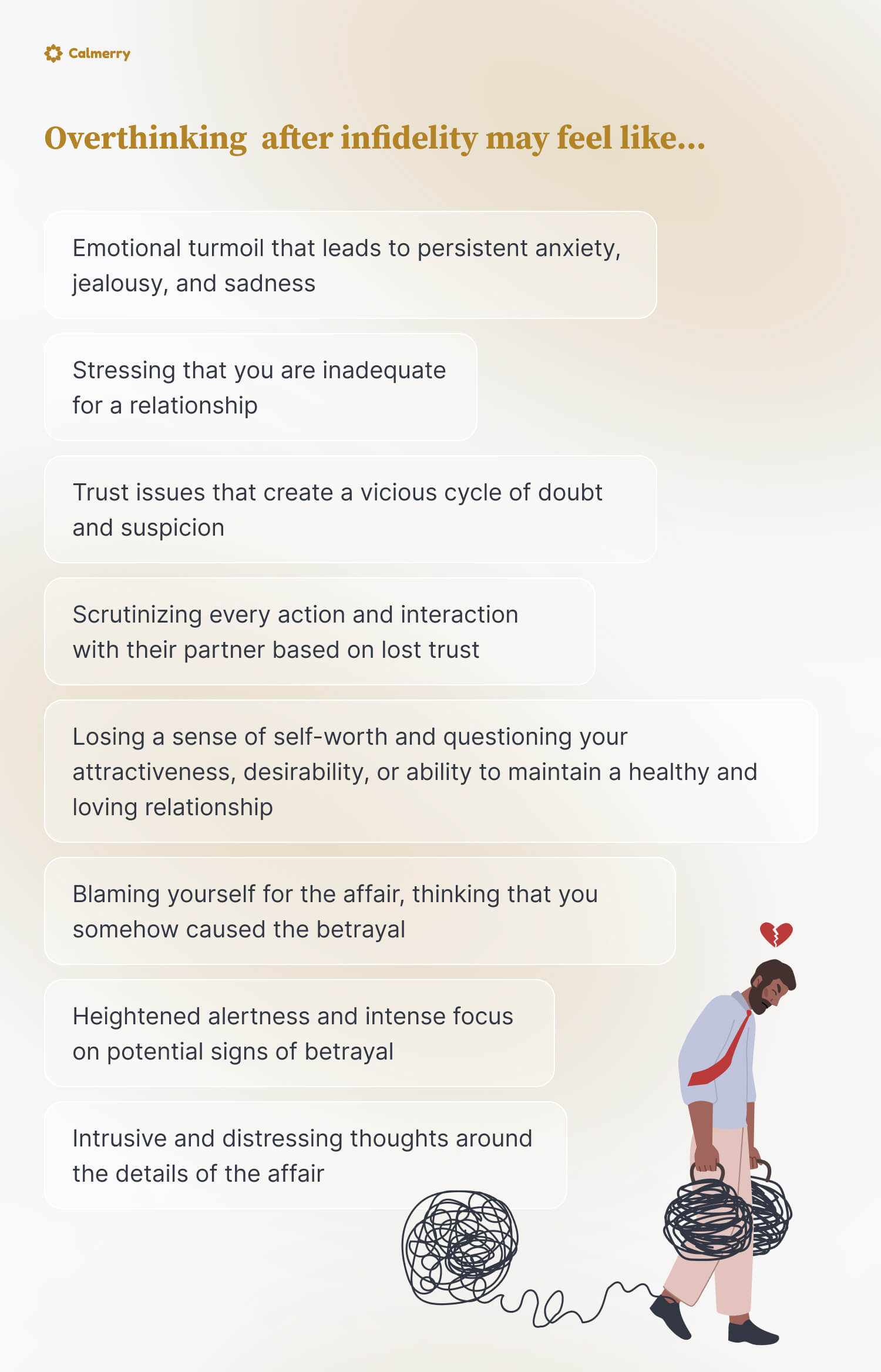How to Stop Overthinking After Being Cheated On and Start Moving On

In this article
Being cheated on is one of the most complicated life events to comprehend. It shakes you to your core and can create a long list of questions. It may even feel like the feelings will never pass, and you’ll be stuck feeling confused and awful forever.
“My partner cheated on me, and I can’t stop thinking about it.” Unfortunately, it’s a familiar story: estimates of 20% of extra-marital and 70% of non-married romantic partnerships have involved infidelity. [1] Knopp, K., Scott, S. B., Ritchie, L. L., Rhoades, G. K., Markman, H. J., & Stanley, S. M. (2017). Once a cheater, always a cheater? Serial infidelity across subsequent relationships. Archives of Sexual Behavior, 46(8), 2301–2311. https://doi.org/10.1007/s10508-017-1018-1
After being cheated on, many people experience profound emotional pain. It’s natural to have many confusing thoughts and feelings about what happened. There are many complex layers in your story, and you may even blame yourself as you sort through the “why” of what happened.
Cheating happens to the best of us, and you may want to call on some help as you endure your healing journey. Anxiety after infidelity is something you can overcome with the proper support.
This article will help guide you on how to find peace after being cheated on and move on with your life.
What is infidelity?
Infidelity, also known as cheating, describes the actions of a person in a monogamous relationship who has a sexual or emotional affair with someone outside of the relationship.
Regardless of the circumstances or reasons for infidelity, a promise that was made in marriage vows or an intimate partnership was broken.
While infidelity is harmful and can indicate an abrupt stop to a relationship, it doesn’t necessarily mean the end of love, but rather, intense heartbreak and the dissolution of trust.
– Rychel Johnson, M.S., Licensed Clinical Professional Counselor (LCPC)
Obsessive thoughts after infidelity
Infidelity is a profoundly unsettling and distressing emotional experience that can wreak havoc on your sense of security and self-esteem. It can be a heavy burden as you try to move forward and live your life.
Your thoughts can feel overwhelming when you’re wading through the aftermath of infidelity. You may experience some of the following:
- Emotional turmoil that leads to persistent anxiety, jealousy, and sadness
- Stressing that you are inadequate for a relationship
- Trust issues that create a vicious cycle of doubt and suspicion
- Scrutinizing every action and interaction with their partner based on lost trust
- Losing a sense of self-worth and questioning your attractiveness, desirability, or ability to maintain a healthy and loving relationship
- Blaming yourself for the affair, thinking that you somehow caused the betrayal
Obsessive thoughts after being cheated on are a common and understandable reaction to the profound emotional trauma that infidelity can cause.
These thoughts often revolve around the betrayal and the details of the affair. They can be intrusive, persistent, and distressing, making it challenging to move forward and heal.
Many people replay the events and details of the infidelity in their minds repeatedly. You may obsessively ask yourself questions like “How did it happen?” or “Why did it happen?”
The constant mental gymnastics can be emotionally draining and cause other parts of your life to feel more taxing than usual.
Hypervigilance after infidelity
Like obsessive thoughts in their tendency to hijack your thinking, hypervigilance after infidelity is a state of heightened alertness and intense focus on potential signs of betrayal. It’s a natural response to the trauma and emotional distress caused by infidelity, and it can persist long after discovering the cheating.
This heightened vigilance can profoundly affect an individual’s emotional well-being and ability to heal and move forward.
Someone who has endured infidelity may scrutinize their partner’s behaviors, phone messages, social media activity, and even innocent interactions with other people.
The emotional toll of hypervigilance is significant and can lead to persistent anxiety and paranoia. You know you’re experiencing hypervigilance when it’s challenging to relax your mind or body. Moments of peace are rare – you may feel constantly preoccupied with the possibility of further betrayal. This is exhausting.

Trust issues after being cheated on
Perhaps the rawness of the cheating has passed, but you’ve realized your ability to trust others has changed as a result of the infidelity. Chances are that you’ll encounter trust issues in a new relationship after being cheated on.
Dealing with being cheated on is emotionally draining – taking care of your mental and emotional well-being is essential. This is where therapy can be crucial in helping you to process the pain you’ve experienced to feel capable of moving forward and potentially dating again without constant intrusive thoughts about cheating happening to you again.
You deserve so much better. Working with a qualified therapist can be a game-changer to work through trust issues and emerge stronger.
– Rychel Johnson, M.S., Licensed Clinical Professional Counselor (LCPC)
How do I stop overthinking after being cheated on?
It might feel like overthinking is your “new normal,” but you want to stop being insecure in a relationship after being cheated on.
The good news is that it’s possible to reduce the impact of infidelity on your mental well-being. Here are some steps for you to take:
1. Acknowledge your emotions
It’s normal to feel a wide range of emotions, including anger, sadness, confusion, and betrayal. Allow yourself to feel these emotions without judgment. In other words, “feeling is healing.”
2. Seek support
Talk to trusted friends and family about your feelings and experience. Sharing your thoughts and emotions with someone you trust can provide valuable perspectives and emotional support.
Seeking help from a therapist can also be beneficial in this healing time. Therapists can equip you with strategies for guiding you through the hurts of being cheated on and ways to reframe your intrusive thoughts.
If overthinking impacts your life and well-being, working with a therapist or counselor specializing in infidelity and relationship issues can be very beneficial.
3. Limit exposure to triggers
If certain places, objects, or activities trigger overthinking or painful memories, try to avoid or minimize exposure to them for a while as you heal. Do you drive by your ex-partner’s house? Consider a new route. Do you find yourself browsing social media and feeling worse? Consider temporarily limiting your time spent online. It takes time, but you should feel more capable after enough repetitions of some changed routines.
4. Set boundaries
Establish clear boundaries with the person who cheated on you, whether you continue the relationship or not. Effective boundaries can help prevent further emotional distress and give you a sense of control.
You may want answers from the person who cheated on you, but now may not be the appropriate time. Consider this truth and what is most advantageous to you.
You’re allowed to ask for what you need and hold firm boundaries.
– Rychel Johnson, M.S., Licensed Clinical Professional Counselor (LCPC)
5. Practice self-care
Take care of your physical and mental health by getting enough rest, eating nourishing food, and engaging in joyful and relaxing activities.
6. Mindfulness and meditation
These practices can help you stay in the present moment and reduce rumination. They can help manage overthinking. Listening to soothing music can be therapeutic as well.
7. Journaling
Writing down your thoughts and feelings can be a powerful tool in healing. It can help you organize your thoughts, gain clarity, and release emotional tension.
8. Understand that it’s not your fault
Cheating is a choice made by the person who cheated, not a reflection of your worth or value. Remind yourself that you are not to blame for their action, either verbally or in notes you can post around your home or bedroom.
Understanding that it’s not your fault is a process that is sometimes best explored with the guidance of a therapist. The perspective of an unbiased professional is essential in helping you to move forward.
9. Set goals and priorities
Focus on personal growth and self-improvement. Having a sense of purpose can help shift your attention away from the past.
10. Time heals
Healing from infidelity takes time, so please be patient and gentle with yourself. Overthinking should decrease as you gradually process your feelings and move forward.
Seeking professional support
Remember that everyone’s healing process is unique, and seeking professional help is beneficial if you struggle to manage your thoughts and emotions independently. Ultimately, the goal is to rebuild your self-worth and trust in yourself and others as you move forward.
Surviving infidelity is possible with the right help, and your healing journey will be well on its way before you know it.
Overcoming hypervigilance, overthinking, and other effects of infidelity is a challenging process that may require professional help, such as individual therapy with a counselor. Therapy can assist you in understanding the roots of your concerns, managing your anxiety, and finding healthier ways to rebuild trust and security in relationships.
A word from Calmerry
It’s easier than ever to find help, even in the comfort of your own home. Online therapy is a convenient option when seeking help and is as effective as traditional in-person counseling.
A skillful therapist on Calmerry with training in helping people process infidelity can help you learn coping skills to deal with the emotional aftermath of cheating.
Knopp, K., Scott, S. B., Ritchie, L. L., Rhoades, G. K., Markman, H. J., & Stanley, S. M. (2017). Once a cheater, always a cheater? Serial infidelity across subsequent relationships. Archives of Sexual Behavior, 46(8), 2301–2311. https://doi.org/10.1007/s10508-017-1018-1
online therapy
live video session



